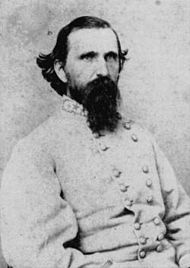John C. Brown
| John Calvin Brown | |
|---|---|
 |
|
| 19th Governor of Tennessee | |
|
In office October 10, 1871 – January 18, 1875 |
|
| Preceded by | Dewitt Clinton Senter |
| Succeeded by | James D. Porter |
| Personal details | |
| Born |
January 6, 1827 Giles County, Tennessee |
| Died | August 17, 1889 (aged 62) Red Boiling Springs, Tennessee |
| Resting place | Maplewood Cemetery Pulaski, Tennessee |
| Political party |
Whig Democratic |
| Spouse(s) | Anne Pointer (d. 1858) Elizabeth Childress (m. 1864) |
| Relations |
Neill S. Brown (brother) Benton McMillin (son-in-law) |
| Profession | Attorney, soldier |
| Military service | |
| Allegiance | Confederate States of America |
| Service/branch | Confederate States Army |
| Years of service | 1861–1865 |
| Rank |
|
| Battles/wars |
American Civil War • Fort Donelson (1862) • Perryville (1862) • Chickamauga (1863) • Missionary Ridge (1863) • Atlanta Campaign (1864) • Franklin (1864) |
John Calvin Brown (January 6, 1827 – August 17, 1889) was an American politician, soldier and businessman. He served as Governor of Tennessee from 1871 to 1875, and was president of the state's 1870 constitutional convention, which wrote the current Tennessee State Constitution. Although he originally opposed secession, Brown fought for the Confederacy during the American Civil War, eventually rising to the rank of major general.
A leader of the state's Bourbon Democrats, Brown dedicated much of his time as governor to solving the state's mounting debt issues. Following his gubernatorial tenure, he advocated railroad construction, briefly serving as president of the Texas & Pacific Railroad in 1888, and as president of the Tennessee Coal, Iron and Railroad Company in 1889.
Brown was born in Giles County, Tennessee, the son of Duncan and Margaret Smith Brown. He was the younger brother of Neill S. Brown, who served as governor of Tennessee in the late 1840s. John graduated from Jackson College in Columbia, Tennessee, in 1846. He studied law with his uncle, Hugh Brown, in Spring Hill, and was admitted to the bar in 1848. He began practicing law in Pulaski that same year.
Like his brother, Brown was a Whig prior to the Civil War, and following the Whig Party's collapse in the mid-1850s, he continued to support former Whig candidates. During the presidential election of 1860, he served as an elector for the Constitution Union Party candidate John Bell, who opposed secession, and took a neutral stance on the issue of slavery. In the weeks following the Battle of Fort Sumter in April 1861, however, secessionist sentiment swept across Middle Tennessee, and Brown, along with his brother and, eventually, John Bell, switched sides and supported the burgeoning Confederacy.
...
Wikipedia
